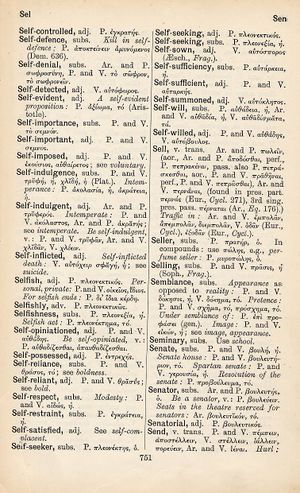senator
Πατὴρ οὐχ ὁ γεννήσας, ἀλλ' ὁ θρέψας σε → Non qui te genuit, est qui nutrivit pater → Dein Vater ist, wer Nahrung dir, nicht Leben gab | nicht Vater ist, wer Leben, sondern Nahrung gab
English > Greek (Woodhouse)
subs.
Ar. and P. βουλευτής, ὁ.
Be a senator, v.: P. βουλεύειν.
Seats in the theatre reserved for senators: Ar. βουλευτικόν, τό.
Latin > English (Lewis & Short)
sĕnātor: ōris, m. senex,
I a senator, a member of the Roman Senate, a body consisting originally of one hundred eminent citizens, selected by Romulus for their age, wisdom, and experience, out of the noblest families, to be his council in the government. When the Sabines were incorporated with Rome, the number was doubled; and Tarquin the Elder raised it to three hundred; Sulla to four hundred; Julius Cæsar to nine hundred, while Augustus reduced it to six hundred. Originally, patricians alone were eligible to seats in the Senate; but later additions were made from the Knights (v. senatus). The senators were nominated by the kings; and, after they were expelled, by the consuls and dictators. Later, the censors revised the roll of senators every lustrum, excluding members regarded as unworthy. (On the powers of the Senate, the privileges, dress, etc., of its members, v. Dict. of Antiq. s. v. Senatus.) —Sing.: huic (senatori) jussa tria sunt: ut assit, etc., Cic. Leg. 3, 18, 40; id. de Or. 1, 2 fin.; 1, 49, 215; id. Clu. 47, 132; 56, 154; Quint. 11, 1, 36; 11, 1, 43; Hor. S. 1, 6, 77; 1, 6, 110 al.—Plur., Cic. Sen. 16, 56; Caes. B. C. 1, 17; Liv. 36, 3 al.—Out of Rome, of the Nervii, Caes. B. G. 2, 28.—Of the Rhodians, Cic. Rep. 3, 35, 48.—Of the Macedonians ( = σὐνεδροι), Liv. 45, 32 et saep.— Of the Persians, Vulg. Dan. 6, 7.

